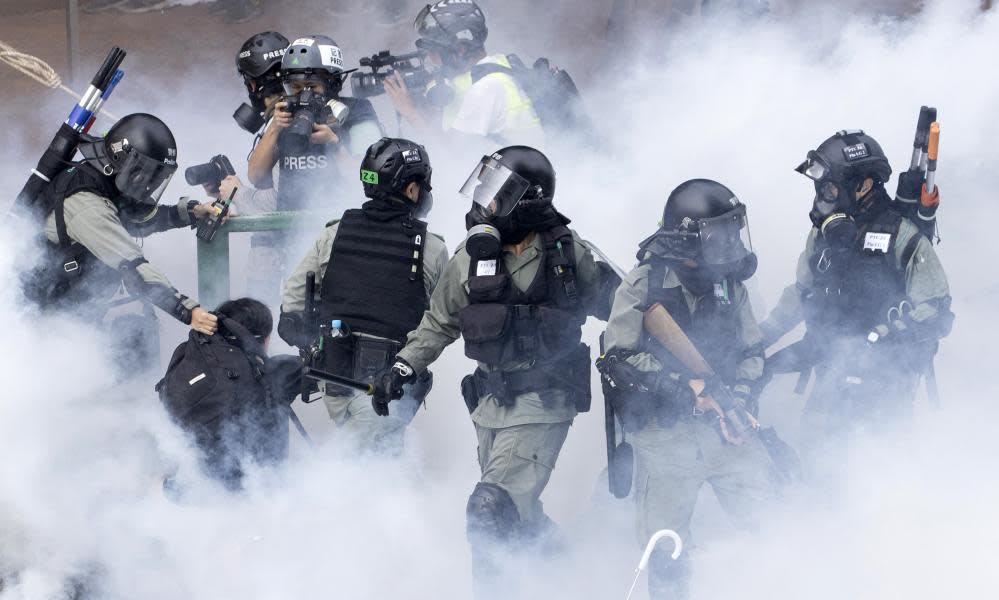How Hong Kong's local elections have become a proxy vote on the protests

This Sunday Hong Kong holds district council elections. Normally a sleepy affair with low turnout, this year they have become a focus of intense interest.
Nearly six months of protests have upended daily life, and the poll is expected to serve as a kind of proxy referendum on the movement and its calls for greater democratic rights.
Even as violence escalated, there have been strong demonstrations of public solidarity with frontline protestors. But Hong Kong authorities argue a “silent majority” backs their hardline stance.
This weekend both sides’ claims of popular support will be put to the test at the polling booth, in an election that is no longer simply about who sits on relatively toothless local councils.
Related: My beloved Hong Kong has become a war zone and daily life is full of anxiety
“It’s is one of the few avenues we have left to express our voice,” said Lokman Tsui, assistant professor of communication at the Chinese University of Hong Kong: “When you are continually and structurally being disenfranchised, you hold onto any right you have left.”
How will the elections work?
Hongkongers will be asked to choose 452 district councillors, who serve on 18 different councils across the city. All Hong Kong permanent residents who are 18 or over have the right to vote. Voting opens at 7.30am, with over 600 polling stations across the city serving 4.13m registered voters.
Polls close at 10.30pm, and vote counting starts straight away. The first results are likely to come through in the early hours of Monday morning and the full picture should be clear by the time the city goes back to work.
In the last elections, pro-Beijing parties won a clear majority, over 783,000 votes compared with 540,000 for opposition pro-democracy parties. It gave them 298 of the seats, and control of all but one of the district councils.
Now pro-democracy parties hope to significantly erode or overturn that lead. They will be looking at the overall number of votes cast for their candidates, not just the number of seats they can take.
Who is competing?
Hong Kong has a plethora of small political parties, that broadly divide into two camps. The pro-Beijing establishment holds the balance of power, while pro-democracy groups serve almost perpetually in opposition, both on the district councils and in the city’s legislature.
Deep pockets and strict discipline have helped pro-Beijing parties smooth their way to victory in past elections. The DAB – democratic alliance for the betterment and progress of Hong Kong – is easily the city’s biggest party.
There is no equivalent heavyweight party on the pro-democracy side. The multitude of groups have struggled with fractured political alliances, and lack of funds in the past. But this year they have been united by a common enemy.
For the first time ever, they aim to field candidates in every seat, including strongly pro-Beijing areas that have gone uncontested in the past. That will allow them to fight for a greater number of votes overall. They are also coordinating where candidates stand, to avoid splitting the anti-establishment vote.

What does it mean if they win?
In immediate practical terms, taking over some or all of the district council seats will have very little impact. The lowest level of political authority, the councils have only a limited budget for local affairs like road repairs and rubbish collection.
But any reversal of the balance of power would be a rebuke to China and the Hong Kong government and a sign of broad public support for the protest movement.
In the longer term it could also give democrats a slightly greater say in Hong Kong’s future, because district councils have a modest role in choosing the city’s leader, and members of its parliament, the legislative council.
The chief executive is chosen every five years by a complex indirect electoral college system that aims to give Beijing a firm hand on who runs Hong Kong.
There are 1,200 seats on the electoral college, with 117 awarded to whoever controls the majority of district councils. This “winner takes all” system has given Beijing a reliable vote bank over the two decades its supporters have controlled the councils.
Even if pro-democracy candidates claim those seats, it would not be enough to tip the balance of power in the electoral college. But it might perhaps turn them to into kingmakers.
“I don’t think we will be able to choose the next chief executive, but at least we are talking about bargaining power, leverage,” said Kenneth Chan, a professor at Hong Kong Baptist University and former pro-democracy lawmaker.
Could the elections be tampered with or delayed?
With so much at stake, fears that the vote will be skewed have been mounting. Hong Kong has extensive experience holding elections, and good infrastructure for monitoring polls, so observers say direct vote tampering is relatively unlikely.
A greater concern is voter intimidation. There have already been attacks on pro-democracy protests leaders and candidates, with one losing an ear after he was bitten and others stabbed. One prominent pro-Beijing campaigner was also stabbed.
Hong Kong authorities are reportedly considering sending riot police to guard polling stations, a potentially provocative move given widespread anger at police brutality.
For months protestors and pro-democracy law makers have warned that they fear the government will try to delay the elections, on the pretext of instability.
Hong Kong’s mini-constitution, the Basic Law, allows for them to be delayed for a brief period. But all sides agree that would be an inflammatory move, likely to fuel frustration among both hardline protestors and the wider public.
The government has reportedly ben given the green light from China to go ahead with the election, after authorities weighed up the consequences of a delay and apparently decided that a potential battering at the polls was the lesser of two evils.

